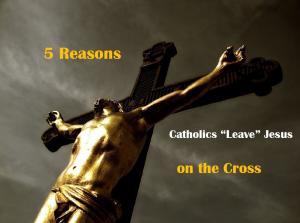Recently, a very dear friend of mine (a Presbyterian pastor) asked me a question often asked Catholics: Why the crucifix in Catholic Churches? Good question. Why do Catholics “leave” Jesus on the cross in our churches?
St. Paul answers this question in 1 Corinthians 2:2:
For I decided to know nothing among you except Jesus Christ and him crucified.
Now, to leave it at that would not appease my friend. So, below are the five reasons Catholic Churches leave Jesus on the cross.
Whose Cross Anyway?
Our Lord Jesus was not the first the Romans crucified on a cross, although He is the most well-known. During the earthly life of Jesus, the Romans used crucifixion to send a message—mess with the Roman Empire and suffer the same fate. Most notably, crucifixion is widely understood as the most cruel and excruciating form of public execution. In fact, the etymology of the word excruciate means to crucify. In short, the cross was a means of horrific public execution. Furthermore, only with Jesus does the cross take on meaning synonymous with hope. Through His sacrifice, Jesus transformed an instrument of death into one of salvation and hope. Therefore, for Catholics, a cross without Christ reverts to a mere instrument of torture. The corpus (body) on the cross shows the transformed cross, Christ’s cross.
A Sacramental People
In a past article on sacraments, I wrote:
Saint Pope John Paul II states that being created in the image of God humans are “both a corporeal and spiritual being.” As corporeal we relate to the external world physically via five senses. We see, hear, smell, touch, and taste the world. We are therefore sensory dependent.
Furthermore, as an incarnational faith, a faith of the God-man, God took on an image (Philippians 2:7). This image, the human body of Jesus, died on a cross. As those who looked upon the crucifixion as it happened, so too we look upon the crucifix and see the price paid for our sins. While not a sacrament, the crucifix has a sacramental aspect, as it has a material form but also relates an underlying spiritual truth.
A Reflection of Gospel Liturgy
For the life of me, one of the greatest misnomers I read from former Catholics is that they never heard the gospel in “all their years in the Catholic Church.” Did they open their eyes? Did they listen to the words of the scripture reading and the Eucharist prayers? For example:
It is truly right and just, our duty and salvation, always and everywhere to give you thanks, Father most holy, through your beloved Son, Jesus Christ, your Word through whom you made all things, whom you sent as our Savior and Redeemer, incarnate by the Holy Spirit and born of the Virgin. Fulfilling your will and gaining for you a holy people, he stretched out his hands as he endured his Passion, so as to break the bonds of death and manifest the resurrection.
With this prayer the priest begins the Eucharistic celebration. This prayer presents the clear message of the gospel, that is, our salvation comes through Jesus as savior and redeemer of the world. In Jesus’s death, the bonds of death are broken. In Jesus’s resurrection, the promise of resurrection secured. Moreover, through their eyes, the Catholic sees the image of the savior and redeemer on the cross. In the crucifix, Christ “stretched out his hands as he endured his Passion…”
The Way of Salvation Through the Cross
The Catechism of the Catholic Church, paragraph 618, perfectly expresses meaning of the crucifix in Catholic life. It states:
The cross is the unique sacrifice of Christ, the “one mediator between God and men”. (1 Timothy 2:5) But because in his incarnate divine person he has in some way united himself to every man, “the possibility of being made partners, in a way known to God, in the paschal mystery” is offered to all men. He calls his disciples to “take up [their] cross and follow [him]”, (Matthew 16:24) for “Christ also suffered for [us], leaving [us] an example so that [we] should follow in his steps.” (1 Peter 2:21) In fact Jesus desires to associate with his redeeming sacrifice those who were to be its first beneficiaries. (Colossians 1:24) This is achieved supremely in the case of his mother, who was associated more intimately than any other person in the mystery of his redemptive suffering. (Luke 2:35)
The crucifix reminds Catholics that following the way of Christ leads to suffering—but redemptive suffering. To follow Christ, we must take up our crosses and die to our own selfishness and sin. We must become like Christ to the point of death. For…
If we have died with him, we will also live with him;
if we endure, we will also reign with him;
if we deny him, he also will deny us;
if we are faithless, he remains faithful—
The Crucifix Affirms, Not Devalues the Resurrection
Moreover, some claim that the crucifix (with Christ on the cross) devalues and deemphasizes the resurrection of Christ. They further claim that a naked cross better reflects the truth of the resurrection, as Christ is no longer there. True, Christ no longer suffers on the cross. Also true—a bare cross only tells half the story. This is why St. Augustine echoing St. Paul stated in a sermon:
The apostle Paul saw Christ and extolled his claim to glory. He had many great and inspired things to say about Christ, but he did not say that he boasted in Christ’s wonderful works: in creating the world, since he was God with the Father, or in ruling the world, though he was also a man like us. Rather, he said: Let me not boast except in the cross of our Lord Jesus Christ.
In John 10:9, Jesus states:
I am the door; if anyone enters through Me, he will be saved, and will go in and out and find pasture.
A priest once said that the shape of this door is the cross and we must enter through Christ crucified to receive salvation. Before Easter Sunday, there was Good Friday. Likewise, a crucifix with Jesus (Good Friday) anticipates the resurrection to come (Easter). Therefore, the crucifix affirms and does not devalue the resurrection.
To Sum Up
In summary, Catholics prefer crucifixes for the following reasons:
- Through His sacrifice, Jesus transformed an instrument of death into one of salvation and hope. For Catholics, a cross without Christ reverts to a mere instrument of torture, not a symbol of hope.
- While not a sacrament, the crucifix has a sacramental aspect, as it has a material form but also relates an underlying spiritual truth. This truth: God took on human form and gave everything for our salvation.
- Through their eyes during Mass, the Catholic sees the image of the savior and redeemer on the cross. In the crucifix, Christ “stretched out his hands as he endured his Passion…” In this way, the Catholic understands the gospel message presented during the Eucharist.
- The crucifix reminds Catholics that following the way of Christ leads to suffering—redemptive suffering. To follow Christ, we must take up our crosses and die to our own selfishness and sin. We must become like Christ to the point of death.
- Before Easter Sunday, there was Good Friday. Likewise, a crucifix with Jesus (Good Friday) anticipates the resurrection to come (Easter). Therefore, the crucifix affirms and does not devalue the resurrection.
May we all look upon the crucifix and come to believe in the One who gave all for our salvation.
Thank you!
If you enjoy my writing and want to support my work, please consider donating $1 or any size gift by clicking here. Thank you!
Read my other writing here.
Please click the link below to join.














